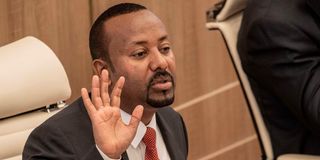Ethiopia warns UN-backed probe could 'undermine' peace process

Ethiopian Prime Minister Abiy Ahmed addresses a Parliament session in Addis Ababa, Ethiopia, on November 15, 2022.
What you need to know:
- At a rare press conference last week, Eritrean President Isaias Afwerki said allegations of rights abuses by his forces in Ethiopia's Tigray region amounted to "fantasy".
Ethiopia warned on Wednesday that efforts by UN-backed investigators to probe abuses committed during the war in the country's north could "undermine" the progress of a peace agreement signed last year.
The federal government and the Tigray People's Liberation Front (TPLF) inked a peace deal in South Africa in November to end the two-year Tigray war, which has killed untold numbers of people and unleashed a humanitarian crisis.
In its first report published in September last year, the UN-backed International Commission of Human Rights Experts on Ethiopia said it had found evidence of violations by all sides that could amount to war crimes and crimes against humanity.
Ethiopia's government rejected the report and has embarked on a diplomatic offensive to win international support for its bid to stop the commission from continuing its work.
On Wednesday, Ethiopia's Deputy Prime Minister and Foreign Minister Demeke Mekonnen said the commission "could undermine the AU-led peace process & the implementation of the Pretoria Peace Agreement with inflammatory rhetoric", referring to the African Union, which mediated the negotiations.
"It could also undermine the efforts of national institutions," he told an AU ministerial session ahead of the pan-African bloc's summit in Addis Ababa this weekend, the foreign ministry said on Twitter.
The three-member commission, which was created by the UN Human Rights Council, has urged the Ethiopian government, its ally Eritrea and the TPLF to investigate and bring all perpetrators of abuses to justice.
Atrocities
At a rare press conference last week, Eritrean President Isaias Afwerki said allegations of rights abuses by his forces in Ethiopia's Tigray region amounted to "fantasy".
"This is a fantasy in the minds of those who are... in this factory I call a factory of fabricating misinformation," Isaias said during a visit to Kenya, deflecting questions about the presence of Eritrean troops in Ethiopia.
Eritrea's army supported Ethiopian forces during the war and has been accused by the United States and rights groups of some of the conflict's worst atrocities.
Asmara was not a party to the peace agreement and its troops remain in parts of Tigray, according to residents who accuse the soldiers of murder, rape and looting.
Under the terms of the peace deal, the TPLF agreed to disarm in return for the restoration of access to Tigray, which was largely cut off from the outside world during the war.
Since the deal, there has been some resumption of basic services and aid deliveries to Tigray, which has faced dire shortages of food, fuel, cash and medicines.
Access to the region of six million people remains restricted, and it is impossible to verify independently the situation on the ground.
The war erupted in November 2020 after Prime Minister Abiy Ahmed, a Nobel Peace Prize laureate, sent troops into Tigray, accusing the TPLF of attacking army bases there.





